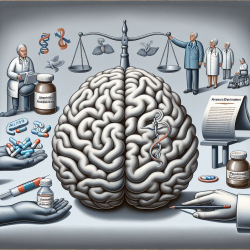Music and Brain Surgery: A Harmonious Approach
In the intricate world of neurosurgery, innovation and creativity are key to improving patient outcomes. One fascinating approach that has emerged is the integration of music during awake craniotomies for brain tumor resections. A recent case study titled Awake Craniotomy and Intraoperative Musical Performance for Brain Tumor Surgery: Case Report and Literature Review explores this innovative technique and its potential benefits.
The Case Study: A Musical Journey
The case study details the journey of a 34-year-old professional musician who underwent an awake craniotomy to remove a glioma located in the eloquent cortex. During the procedure, the patient played the guitar and sang, allowing surgeons to map brain functions related to music, speech, and motor skills. Remarkably, the patient not only preserved his musical abilities but also experienced improvements in his musical performance post-surgery.
Why Music?
Music processing involves complex neural networks that overlap with those used for language and motor functions. By integrating music into brain mapping during surgery, surgeons can better preserve these functions, especially for patients whose livelihoods depend on musical abilities. The case study reveals that using standard brain mapping over music processing mapping did not yield negative outcomes, suggesting that music can play a crucial role in surgical success.
Key Findings
- Music mapping during awake craniotomies is feasible and can yield positive outcomes.
- Standard mapping techniques may suffice for preserving musical abilities.
- Musical performance during surgery can enhance postoperative recovery and function.
Implications for Practitioners
For practitioners, this case study offers valuable insights into the potential of music as a tool for improving surgical outcomes. By considering the integration of music mapping in surgeries, neurosurgeons can enhance their approach to preserving essential functions in patients. Additionally, this study encourages further research into standardizing music mapping techniques and understanding their long-term benefits.
Future Directions
While the current findings are promising, more research is needed to fully understand and standardize music mapping during brain surgeries. Practitioners are encouraged to explore this innovative approach and contribute to the growing body of knowledge. By doing so, they can help refine techniques that may revolutionize how we approach complex brain surgeries.
To read the original research paper, please follow this link: Awake Craniotomy and Intraoperative Musical Performance for Brain Tumor Surgery: Case Report and Literature Review.










